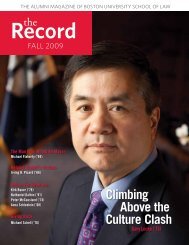the nature of representation: the cherokee right ... - Boston University
the nature of representation: the cherokee right ... - Boston University
the nature of representation: the cherokee right ... - Boston University
You also want an ePaper? Increase the reach of your titles
YUMPU automatically turns print PDFs into web optimized ePapers that Google loves.
116 PUBLIC INTEREST LAW JOURNAL [Vol. 15<br />
leaders <strong>of</strong> “misrepresenting” Treaty propositions in order to “prejudice <strong>the</strong> minds<br />
<strong>of</strong> <strong>the</strong> common people,” an accusation which Schermerhorn used to justify <strong>the</strong> form<br />
<strong>of</strong> U.S.-Cherokee negotiations that took place at New Echota. 134 U.S. frustration<br />
with <strong>the</strong> resistance to removal comes across in <strong>the</strong> report from <strong>the</strong> Commissioner <strong>of</strong><br />
Indian Affairs that <strong>the</strong> Daily National Intelligencer printed for its District <strong>of</strong><br />
Columbia readers:<br />
There has been no intermission <strong>of</strong> exertion to induce <strong>the</strong> removal <strong>of</strong> <strong>the</strong><br />
Cherokees to <strong>the</strong> west <strong>of</strong> <strong>the</strong> Mississippi, in conformity with <strong>the</strong> policy<br />
adopted by <strong>the</strong> Government in favor <strong>of</strong> <strong>the</strong> Indians, and to which <strong>the</strong>y form<br />
almost, <strong>the</strong> sole exception. There can be little doubt that bad advisement and<br />
<strong>the</strong> intolerant control <strong>of</strong> chiefs adverse to <strong>the</strong> measure, have conduced to <strong>the</strong><br />
disinclination <strong>of</strong> a large portion <strong>of</strong> <strong>the</strong> nation to emigrate, and avail <strong>the</strong>mselves<br />
<strong>of</strong> <strong>the</strong> obvious benefit in <strong>the</strong> contemplated change. 135<br />
The U.S. blamed <strong>the</strong> Cherokee leadership for difficulties in implementing removal<br />
in an attempt to deflect attention from general Cherokee resistance to forced<br />
relocation.<br />
The internal Cherokee dispute should not be exaggerated, for though <strong>the</strong> U.S.<br />
government conveniently sided with <strong>the</strong> pro-removal Ridge group, <strong>the</strong> Cherokee<br />
people supported Ross’s government. Mason recorded:<br />
The influence <strong>of</strong> this chief is unbounded and unquestioned; <strong>the</strong> whole nation <strong>of</strong><br />
eighteen thousand persons is with him. . . . It is evident, <strong>the</strong>refore, that Ross<br />
and his party are in fact <strong>the</strong> Cherokee nation. . . . I believe that <strong>the</strong> mass <strong>of</strong> <strong>the</strong><br />
nation, particularly <strong>the</strong> mountain Indians, will stand or fall with Ross. 136<br />
Major Ridge was aware that he did not represent <strong>the</strong> Cherokees, expressing as<br />
much when signing <strong>the</strong> Treaty <strong>of</strong> New Echota. Ridge “was heard to say, as he<br />
made an X, that he had signed his death warrant. He justified his action with <strong>the</strong><br />
argument than an intelligent minority has a moral <strong>right</strong> and duty to save a blind<br />
and ignorant majority from inevitable ruin.” 137<br />
Ross was aware that <strong>the</strong> U.S. might not recognize him as anything more than<br />
one <strong>of</strong> several vying leaders. Not surprisingly, Ross’s rejection <strong>of</strong> <strong>the</strong> New Echota<br />
INDIANS, 24th Cong., 1st Sess., 20-27 at 21.<br />
134<br />
Letter fromJohn F. Schermerhorn, to Lewis Cass (Mar. 3, 1836), in TREATY WITH<br />
THE CHEROKEE INDIANS, 24th Cong., 1st Sess., 54-61, at 54.<br />
135<br />
Documents, Accompanying <strong>the</strong> Message <strong>of</strong> <strong>the</strong> President <strong>of</strong> <strong>the</strong> United States,<br />
supra note 97, at 2.<br />
136<br />
Letter from J. Mason, Jr., supra note 92, at 4. See also, GABRIEL, supra note 13, at<br />
152 (“Andrew Jackson might dominate Washington, but John Ross still ruled in <strong>the</strong><br />
mountains.”).<br />
137<br />
EHLE, supra note 4, at 295. Major Ridge was correct that he was probably<br />
forfeiting his life. On June 22, 1839, he along with Elias Boudinot and his son John<br />
Ridge who were both also treaty signers, were “brutally murdered. . . . John Ross<br />
denied any complicity or approval <strong>of</strong> <strong>the</strong> deed; but he could not completelyshake <strong>the</strong><br />
accusations made against his party.” PRUCHA, supra note 17, at 181.









